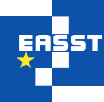|

General Chair
Tiziana Margaria
(Univ. Potsdam, D)

Program Chairs
Jens
Knoop
(TU Vienna, A)

Dietmar Schreiner
(TU Vienna, A)

Program Committee
Jose Maria Canas Plaza (Univ. Rey Juan Carlos)
Markus Bader (Vienna Univ. of Techn.)
Karl M. Göschka (Vienna Univ. of Techn.)
Vincent Hugel (Univ. de Versailles)
Jens Knoop (Vienna Univ. of Techn.)
Gerald Steinbauer (Graz Univ. of Techn.)
Dietmar Schreiner (Vienna Univ. of Techn.)
Stefan Tasse (TU Dortmund Univ.)
Markus Vincze (Vienna Univ. of Techn.)
Arnoud Visser (Univ. of Amsterdam)
Franz Wotawa (Graz Univ. of Techn.)
Deadlines:
Submission:
September 2, 2011
Notification: September 12, 2011
Camera-ready copy: October 2,
2011
Early Registr.: September 30,
2011
Organizer

Vienna
University of Technology,
Institute of Computer Languages
Sponsor


|
1st
International ISoLA Workshop on
Software Aspects of Robotic
Systems
http://www.cs.uni-potsdam.de/isola2011
The development of autonomous robotic systems has
experienced a remarkable boost within the
last years. Away from stationary
manufacturing units, current robots have grown up
into autonomous, mobile systems that not
only interact with real world environments,
but also fulfill mission critical tasks in
collaboration with human individuals on a
reliable basis. Typical fields of application are
unmanned vehicles for exploration but also
for transportation, reconnaissance and
search-and-rescue in hazardous environments, and
ambient assisted living for elderly or
disabled people.
Hence, algorithms in cognition, computer vision,
and locomotion have become hot-spots of research
and development. In addition, modern concepts like
evolutionary and bio-inspired design have entered
the stage to tackle open issues in robotics and to
cope with domain specific properties like inherent
indeterminism.
The back-side of this boost is an even larger
increase in complexity of modern robotic systems.
Numerous actuators and sensors have to be
controlled simultaneously. Complex actions have to
be performed via timed parallel execution of
multiple instruction streams on distinct electronic
control units. Autonomy, especially long term
autonomy as required by deep-sea or space
exploration missions, necessitates features
of fault-tolerance, error recovery, or at least
well-defined fallbacks. Due to the physical
interaction of robots with the real world,
safety violations are extremely harmful, in the
worst-case they might lead to severe damage and
even to casualties.
The goal of this Workshop is to bring together
researchers and practitioners who are
interested in the software aspect of robotic
systems. Topics of interest for the workshop
include (but are not limited to): robot
programming, languages and compilation techniques,
real-time and fault tolerance, dependability,
software architectures, computer vision, cognitive
robotics, multi-robot-coordination, simulation,
bio-inspired algorithms, Machine-Learning.
Authors are invited to submit original, unpublished papers on basic as much as applied research, which are not being considered in another forum. All submitted papers will be carefully evaluated based on originality, significance, technical soundness, and clarity of expression. All submissions must be in English. Submissions should be in PDF format and must not exceed 15 pages in the final camera-ready format.
Accepted papers are
planned to be published in Communications in
Computer and Information Science (Springer Verlag,
Heidelberg). Selected papers will appear in the
International Journal on Software Tools for
Technology Transfer (Springer Verlag,
Heidelberg).
|
